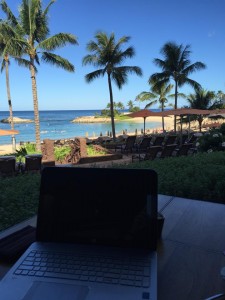[fusion_builder_container hundred_percent=”yes” overflow=”visible”][fusion_builder_row][fusion_builder_column type=”1_1″ background_position=”left top” background_color=”” border_size=”” border_color=”” border_style=”solid” spacing=”yes” background_image=”” background_repeat=”no-repeat” padding=”” margin_top=”0px” margin_bottom=”0px” class=”” id=”” animation_type=”” animation_speed=”0.3″ animation_direction=”left” hide_on_mobile=”no” center_content=”no” min_height=”none”]
Ko Olina, Hawaii
I write these words in the midst of what teachers fantasize about all year: a mid-July Hawaiian vacation with my family.
I am currently looking out on a lagoon where early risers are partaking in yoga on the beach and other type A personalities are doing exercises on surf boards in the ocean water. My family is still in the clutches of a sweet vacation slumber that is born of an intentional lack of deadlines, homework, and dogmatic schedules.
As I spend my days making sand castles with my children and sauntering amongst landscapes that are the embodiment of mystic beauty, I find myself thinking about the very thing I am supposed to be escaping. Like a planet kept in its orbit by the muscular gravitational force of the sun, my thoughts turn towards my place in this world. Yes, I am thinking of marriage and fatherhood and faith.
But I am also thinking a great deal about teaching, about my students, about the fact that I have—unbelievably—arrived at the mid-point of my teaching career. I know mid-life is generally a terrain ripe for reflecting on roads not taken and lives not lived.
And yet, as I breathe the air of this tropical paradise and live out these days immersed in the bliss of vacation business, I find I am filled with an unspeakable, penetrating, transcendent joy about a great many things, a joy that should always be present as I live a supremely privileged life, but one that is often obscured behind the curtain of life’s daily minutia.
This vacation is supposed to be a time to be thankful for being released from the sturm und drang of the academic year, to rejoice that there are no classes to teach, no students to counsel, no curriculum to create or refine.
But instead I am in an almost perpetual prayer of profound thanksgiving that I get to live my life in a classroom. I am thankful because of all the blessings of this life, living the life of a teacher allows me to escape the torment of so many I know and love, the torment of living out my days with a feeling of vacuous futility, convinced that the waves I create will never be ridden by those whose lives I had hoped to improve.
To teach is to escape the fortress of insignificance that imprisons so many. The timeless need to escape this fortress (which we created for ourselves with our own ambitious hands) is omnipresent in our world and in our culture. It is the story of St. Augustine’s Confessions. It is the story in Tolstoy’s Death of Ivan Ilych. It is the story of David Dunn in M. Night Shyamalan’s Unbreakable in which Dunn’s friend and foe succinctly describes his existential illness, “Do you know what the scariest thing is? To not know your place in this world, to not know why you’re here. That’s – that’s just an awful feeling.”
I thank God for knowing my place in this world. I thank God for knowing I am here to be an anchor for my children and a pillar of love and support for my wife. But beyond that I also know that when I leave them every day to go to work I am supposed to harness my energies and limited talents in service of my students.
Teachers are fond of telling their students if they want to be successful then they need to be educated. While this is sage advice, what I am thankful for is knowing that I need the classroom as much as they do. It is the forum from which the gift of my life is made manifest.
St. Augustine famously declared, “Our hearts are restless thy Lord until they repose in thee.” The spiritual ailments that afflict those who live only for themselves, who equate contentment with material attainment, who believe self-promotion is akin to self-actualization, is prominently on display in the various theatres of American life, in the consumerism we promote and the celebrity we crave. Sadly, it is the implicit message we teach when we tell our students getting an education is simply about pursuing professional ambitions.
I know there will certainly come a moment in the next nine months when I would do anything to trade places with where I am today. There will come a moment of exhaustion at the end of the teaching day. There will come a juncture of the school year when I will have to bite my tongue because of my students’ lack of effort or progress. There will be cold days in the midst of winter when a summer vacation in Hawaii will feel like it was not only a different part of the year, but an entirely different life altogether.
In those moments I will certainly be jealous of these vacation days. But I will also know that a vacation is not the same thing as a life. Vacation is a distraction from the serious business of living a substantive life—a life which attempts to honor the commitments that have already been made to one’s family, one’s community, and one’s students.
People who live for vacation are as misguided as our students who live to play video games.
Every blessing I have, every joy I receive, every vacation I have, is as fragile as a Faberge egg. Time is finite, beauty is fleeting, and moments of exaltation always fade. But in this moment, on this vacation, I thank God for knowing my place in this world and for knowing that it is in a classroom, not on a beach.[/fusion_builder_column][/fusion_builder_row][/fusion_builder_container]


